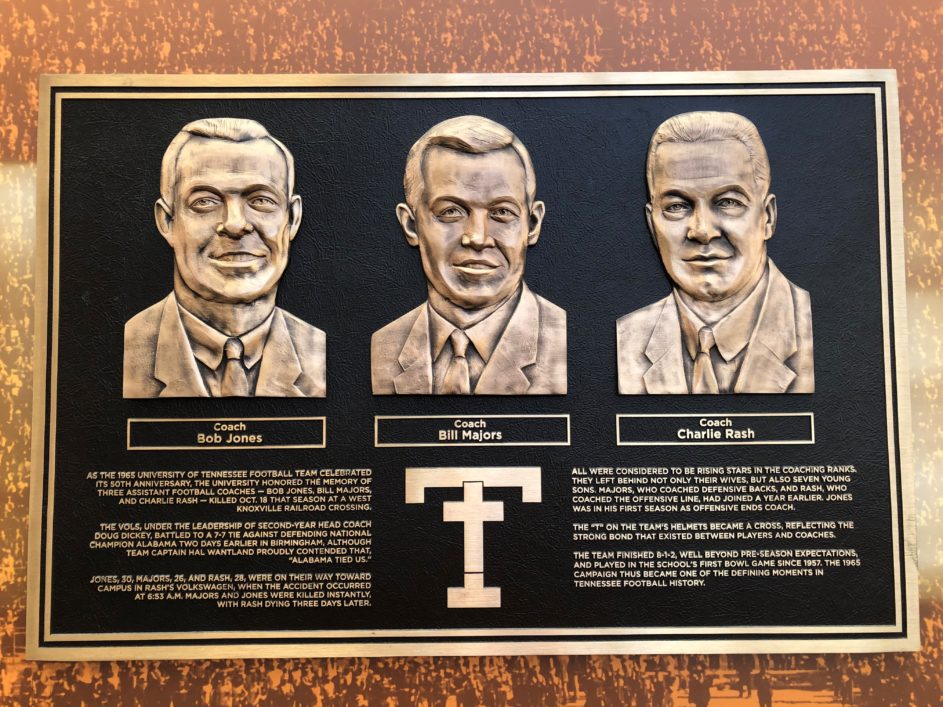It’s been 54 years and Ed Roland still isn’t over it.
On the early Monday morning of Oct. 18, 1965, the then junior at Bearden High was puttering along on his Vespa motorcycle, delivering his newspaper route behind what is now West Town Mall.

Ed Roland
On Cessna Road, he came upon a man out by his mailbox, waiting for his ride to work.
“Good morning, Coach Majors,” said Ed as he handed off a Journal. “Have a great practice today.”
It was an enthusiastic, logical greeting. Bill Majors and the Tennessee football family were still feeling the euphoria from the 7-7 “victory” over Alabama in Birmingham.
“I remember how excited I was,” said Roland. “We were having a great year and I felt honored to speak with a coach. I hoped I could tell one of my friends, ‘Hey! I spoke with Coach Majors this morning.’”
Majors was undoubtedly looking forward to the arrival of coach Charlie Rash and his Volkswagen bug with coach Bob Jones already stuffed inside. The three could resume their replay of Saturday dramatics. There would be a lot more to say about Tide quarterback Snake Stabler throwing away the football to stop the clock – on fourth down.
Roland finished his route. Rash and Jones picked up Majors. A few moments later, at 6:53 a.m., at a grade crossing, Cessna at Westland, just west of Morrell Road, the car was run over by a train. Majors, 26, and Jones, 30, were killed instantly. Rash, 28, lived three days. They left behind three young widows and seven little boys.
Roland arrived home without knowing of the tragedy. He took a short nap before going to school. When he awakened, he heard on the radio about the coaches.
“I was devastated. The Majors home was very close to the crash site. I prayed that his wife was not up to hear the collision.”
Other thoughts raced through Roland’s mind.
“I wished I had been there. I might have done something for the coaches. Not much, I realized. I had only had Boy Scout first-aid training.”
Ed Roland was impressed when he heard that Dr. Andy Holt, UT president, and Doug Dickey, head coach, went immediately to console the families.
Ed’s heart went out to George Cafego when he heard that the man nicknamed “Bad News” was chosen to deliver the really bad news to Bill Majors’ dad, Shirley, and brother John.
Ed did not attend the memorial service at Church Street United Methodist. He was in class. He heard that the whole football team was there. He heard that players gathered at the hospital to keep vigil on Coach Rash’s behalf.
Ed heard all about how the next game went on as scheduled, against Houston, about the memorial prayer, that the band played hymns and that the entire stadium crowd sang “Abide With Me.”
The week made a lasting impact on Ed Roland.
“Coach Majors was my first experience of interacting with someone who would die very shortly. I think that was a big step in growing from a teenager to the man I am.”
Roland became a UT student. He enlisted in the military and chose to become a medic. He landed in Vietnam, assigned to the 1st Air Cavalry at Bien Hoa in 1971 “where we attempted to reduce the impact of indiscriminate rocket attacks on Saigon.”
Of course, he witnessed tragedies and each one reminded him of the three coaches cut down by a train.
It was heavy lifting. He was taught to triage, when you must decide which wounded had the best chance of surviving if treated first.
“It leaves scars on your mind. Did I make a difference or did I let someone die who could have been saved?”
Ed Roland returned to UT, finished his studies and went on with life. He even purchased part-ownership of a plane.
In 1989, he was caught in the tornado which struck Huntsville, Ala. He became a medic again.
“I didn’t save a life, but I knelt by the side of a woman who was terribly injured, and held her hand as she slowly lost the fight to survive. I went to the funeral home the next evening and tried to reassure a grieving family that the wife and mother did not die alone.”
Looking death in the eye sent Ed back to school to become a nurse and then a nurse practitioner. He worked in emergency rooms and in critical care until his daughter urged him to find an opportunity to serve patients long enough to see the successes.
All these years later, he still hasn’t forgotten the three Tennessee coaches.
“I miss being a teenager and being honored to hand a paper to Coach Majors while congratulating his team. … Maybe that’s the best we can do to memorialize their short lives, take a moment and remember that they gave us a part of their glorious accomplishments.”
Indeed, let us remember.
Marvin West welcomes reader remarks or questions. His address is marvinwest75@gmail.com.

